In 2014, the Global Voices Advox team covered more stories than ever before. From Egypt to Ethiopia to Tajikistan to Turkey, our authors wrote what they saw on the ground, on the Internet, in court and behind bars. Here are some highlights from this incredible year of advocacy for free expression around the world:
JANUARY Egypt's Activists Feel Heat of Anti-Protest Law
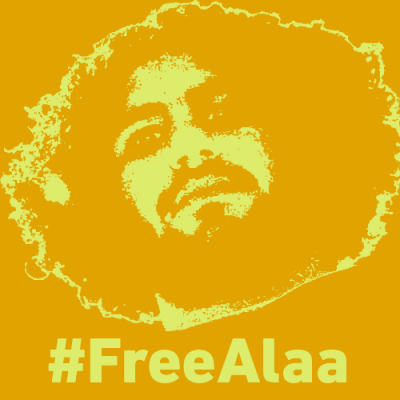
Image by Hugh D'Andrade, used with permission.
The government passed the Protest Law in November 2013 claiming it was necessary to control the chaos created mostly by Muslim Brotherhood sympathizers in clashes with security forces that often turned violent. Since it has been put in effect however, the law has been used to crack down on all kinds of opposition, including peaceful protesters, and individuals and groups that have been closely associated with the January 25 revolution and its aftermath.
- Rasha Abdulla, American University, Cairo
Alaa is in prison not because he committed a crime, not because he said too much, but because his very existence poses a threat to the state. Those who are bold, those who do not relent, will always threaten the terrified and ultimately weak state which must, to survive, squash its opponents like flies. But Alaa will not allow himself to be crushed like that, I know.
- Jillian C. York, Electronic Frontier Foundation, Berlin
FEBRUARY Protests Rage and the Internet Goes Dark in Venezuela
In the midst of a newsprint crisis that has caused nine newspapers to close…and while national television channels are submitted to strict content regulations, hardened even more in recent weeks by President Nicolas Maduro and his so-called “war on sensationalism”, digital media has proved vital in covering news that has is no longer covered by traditional media. Today, as opposition leaders summon rallies around the country, people are expected to turn to social media to learn about the development of the demonstrations, which likely will not be reported on any public or mainstream news platforms.
- Marianne Diaz, lawyer and free speech advocate, Caracas
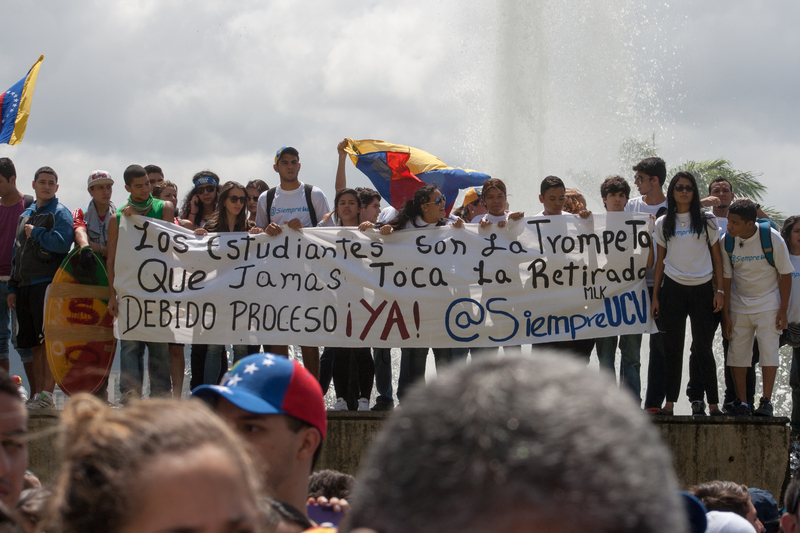
En Táchira estuvimos sin Internet, agua, luz, comida, gasolina, transporte, comercio. Pero si con bolas, las que necesita Venezuela.
— Moisés Maldonado (@MaldonadoMoises) February 21, 2014
In Táchira we were without Internet, water, light, food, gasoline, [public] transport, commerce. But we do have balls, which is what Venezuela needs right now.
MARCH Advocates Hail Brazil's “Bill of Rights for the Internet”
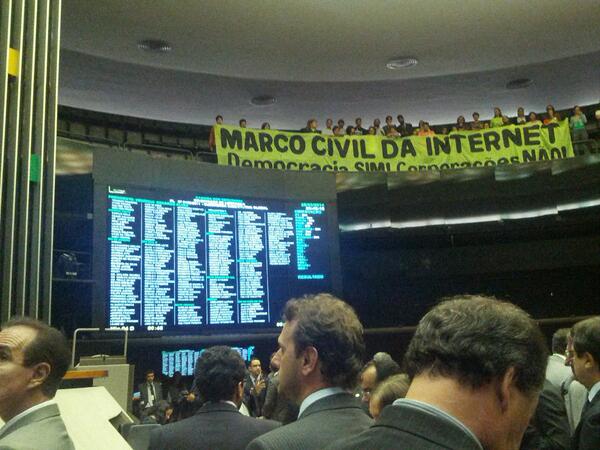
A screen shows the vote tally as activists cheer for the bill from the upper level of the Chamber. Photo shared by Carolina Rossini via Twitter.
The approval of Marco Civil, a bill of rights to protect users, is important not only for the country, but also for the world….In a context where the interests of telecom operators, copyright industry, IT companies and sometimes even the Brazilian state are essentially in opposition with the protection of user's rights, having a text — developed in an open, transparent and participative way — that protects of the right to access, to privacy protection, to freedom of expression, and net neutrality, among others, is a very, very positive step.
- Joana Varon, Institute for Technology and Society, Rio de Janeiro
APRIL Bloggers Arrested, Charged With Terrorism in Ethiopia
Six members of the Zone9 blogging collective — four of them Global Voices contributors — were arrested and imprisoned on April 25, 2014 along with three journalist colleagues. Months later, all nine detainees were charged under the country’s penal code and the Terrorism Proclamation of 2009.
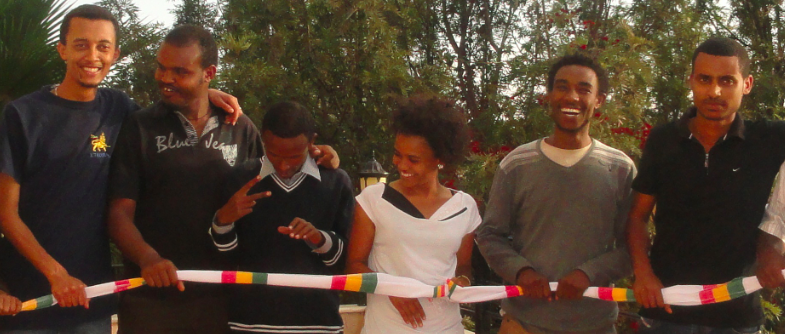
Zone9 members together in Addis Ababa, 2012. Photo used with permission.
In August, we received testimony from Befeqadu Hailu, one of the jailed Global Voices members, who wrote from inside the prison. Here is an excerpt from his testimony:
The idea of setting a foot in the compound of the ill-famed Maekelawi detention center gives a cold shiver to anyone who knows its history. But my sheer optimism and trust that the brutal and inhumane treatment of people was a distant memory saved me from trembling as I was escorted into the compound. The same was true of my friends, I suppose.
What is more, we had nothing to be scared of, because we are neither undercover agents nor members of armed forces. We are just writers. But as soon as I arrived at Maekelawi, detainees informed me that I had been placed in one of the notorious sections of the detention center, known as “Siberia”. In less than a week, I felt like I was living in the middle of an account from the 2013 Human Rights Watch report entitled “They Want a Confession”.
- Befeqadu Hailu, Global Voices translator and Zone9 blogger, Addis Ababa / translation by Endalk Chala, blogger and PhD student, University of Oregon
MAY The Coup and the Information War in Thailand
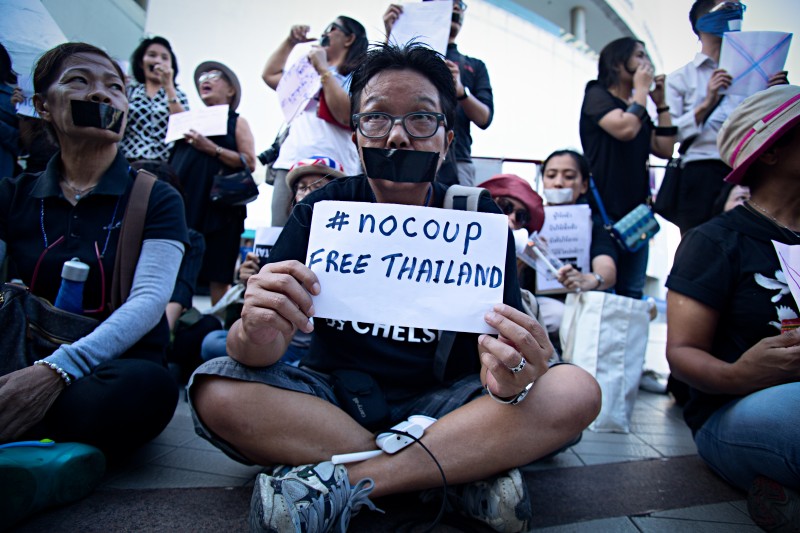
Anti-coup activists and protesters occupy the square outside of Bangkok Art and Cultural Center in central Bangkok. Photo by Lillian Suwanrumpha, Copyright @Demotix (5/23/2014)
Is the military takeover of the media warranted? The coup in 2006, while the military imposed certain restrictions on media freedom, it did not result in this level of information lockdown. Many of the commercial TV channels in Thailand were hardly political: they mostly showed soap operas, game shows and music videos. Perhaps the near ban on media is meant to function as a sweeping act of fear-mongering. Or perhaps the military believes it will help suppress the voices of its opposition.
- Aim Sinpeng, University of British Columbia
JUNE Iraq Telecom Ministry to ISPs: Kill the Internet in Five Provinces
Several Iraqi activists who asked not to be quoted by name attributed the blocking to PM Maliki's failure to get a majority of Parliamentarians to announce a state of emergency in Iraq. If this is true, then orders from the Maliki government and the Ministry of Telecommunication to ISPs to shut down the Internet stand in violation of Iraqi law. Companies have the right to decline the Ministry's request, but activists do not expect this to happen. As one person put it, “keeping their business is their priority — not their users’ rights.”
- Mohamad Najem, Social Media Exchange, Beirut
JULY Presumed Innocent? Not in Tajikistan.
In June, Global Voices’ former Central Asia editor Alex Sodiqov was arrested in Tajikistan while doing research for his PhD dissertation at the University of Toronto. His colleagues, students, and fellow GVers spoke out on his behalf throughout the summer.

About six weeks ago in Khorog police detained my good friend, the young academic Alexander Sodiqov. Disregarding the principle of the presumption of innocence and the laws of our own country, the State Committee for National Security (GKNB) issued a statement to the press the following day, in which Alexander was accused of “espionage” on behalf of “a foreign state.”
Alexander Sodiqov, who our law enforcement agencies have rushed to write into the ranks of state criminals, is a young academic working on his Ph.D. in Canada. To find this out and read his biography in full it is sufficient to type his name into Google or Yandex.[…]
As one of his students, I can say that he was one of the most knowledgeable and professional teachers at the university.
- Anonymous Tajik blogger
AUGUST Bahrain Hacked Human Rights Activists with FinFisher Spyware
The political influence on the judiciary System in Bahrain doesn't provide any space to protect activists from surveillance. But this is an opportunity to move in legal action in UK courts. Now Al Wefaq is in a better position to call HM Revenue & Customs, UK’s tax authority, to investigate in the illegal export of a hacking software for non-free regimes with a dark record of serious human rights violations. How come such a software is licensed to a regime which is considered to be the 3rd worst and 5th most declining regime in Freedom House report?
- Matar Matar, Al-Wefaq human rights group, Bahrain
SEPTEMBER “We Don't Need No Governance”: IGF in Turkey
Photo from the Yaman Akdeniz & Janis Karklins talk from the #ungovForum – we hope to upload the video soon #IGF2014 pic.twitter.com/NqisVvXFqO
— Yaman Akdeniz (@cyberrights) September 5, 2014
In theory, IGF 2014 offered these people the opportunity to speak out about critical problems in the country hosting the forum, as well as the chance to meet and exchange ideas with other activists, journalists, academics and coders from countries all over the world. In practice, however, the voices of these activists were drowned out by the voice of the state, with government representatives alone given a platform to talk about the situation in Turkey. The UN, for its part, promotes a discussion that is general in character, shying away from ”naming and shaming” individual countries. This year, it afforded Turkish officials the perfect opportunity to show just how “perfect” everything in the country is.
- Ahmet A. Sabancı, blogger and digital rights expert, Istanbul
OCTOBER: The Invisible Violence of Cyber War in Hong Kong's Umbrella Revolution
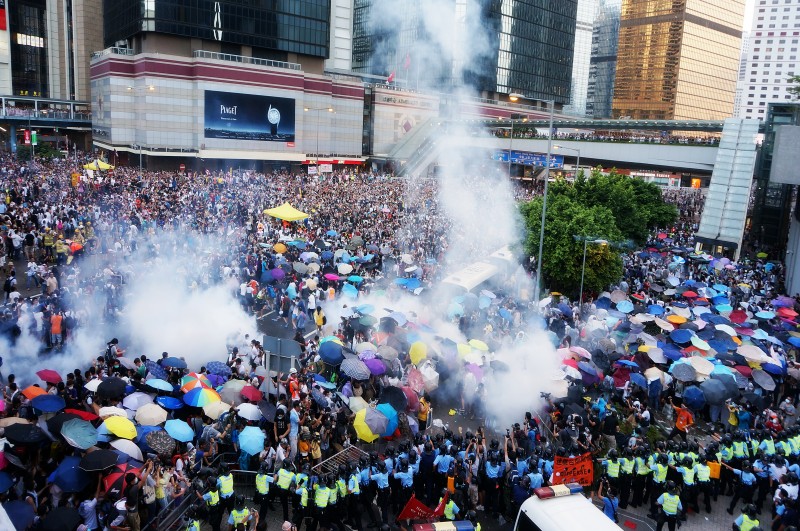
Protesters in Hong Kong stand together after police begin to tear gas the gathering on September 28. Photo by P H Yang. Copyright Demotix
These attacks have thus far gone largely unreported by mainstream media, despite the fact that nearly all the major pro-democracy citizen media have been knocked offline over the past ten days.
[…]
While the government and the pro-establishment camp can employ public resources and even the police to fend off invasions, citizen media have no choice but to resist large-scale attacks on their own. The reason for their survival in this increasingly harsh environment is the awareness that online independent platforms are an essential element of a free society and the tireless, round-the-clock work of their technical teams. Without support from citizens who care about free speech and democracy, citizen independent sites will not be able to sustain this level of technical assault in the longer term.
- Oiwan Lam, Global Voices China Editor and inmediahk Editor
NOVEMBER After 25 Years, Have Hungarians Finally Realized They Live in a Democracy?
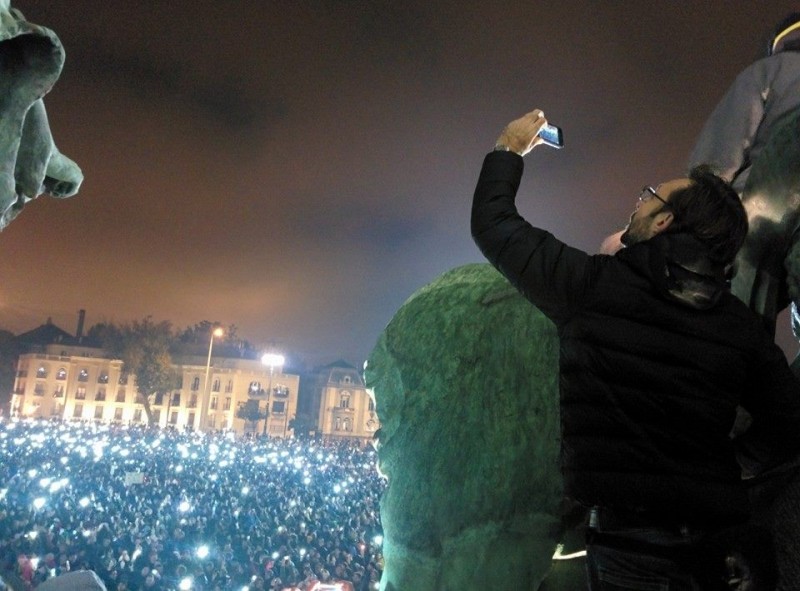
Demonstrators in Budapest, October 2014. Photo by Marietta Le.
As an NGO worker I often worry that citizens are worn out by us constantly sounding the alarm over the grave of Hungarian democracy. But the Internet traffic tax, “netadó” in Hungarian, changed people’s stance towards what the government has been doing for many years. For the first time, it wasn’t only lunatic activists who protested. Young and old were on the streets of Budapest, with memes drawn by hand. People belted out chants about servers, Twitter and Facebook. They wore Guy Fawkes masks, despite this being forbidden by law. Finally, it looked like a whole new generation understood that they have to stand up for their rights. It no longer seemed like a question anymore — people finally could see that all the measures taken by the government were aimed at a certain goal: state capture.
Still, many think the Internet tax proposal was just “disinformation” — false information spread in order to distract the public from important events. This is a concept we remember from the times before 1989. It’s spooky to think that the Berlin Wall fell just 25 years ago. We have entered a period of Hungary’s history when the government is aiming to limit citizens’ rights to the same extent as then, and now almost explicitly and exclusively to their own benefit.
- Marietta Le, Global Voices Hungarian Editor and staff member of Atlatszo.hu
December The Russian Internet is Not Free
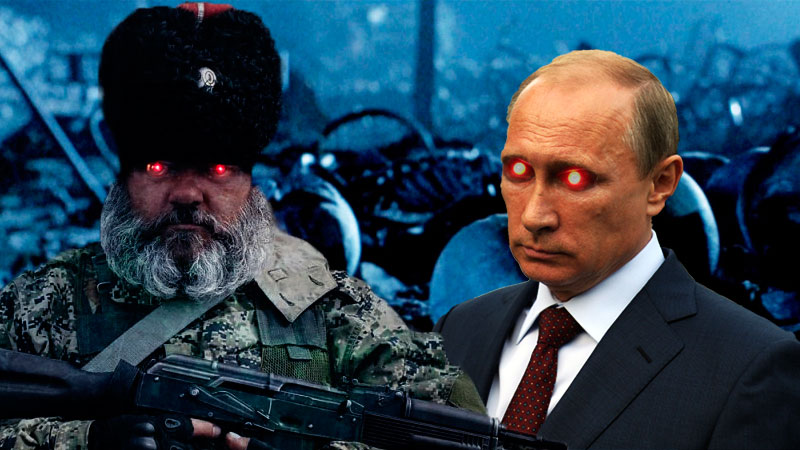
Donbas rebel and Vladimir Putin. Images mixed by Kevin Rothrock.
Throughout 2014, our RuNet Echo team covered the Kremlin's ever-expanding assault on digital rights and the open Internet in Russia, from the Internet blacklist, to the blogger and media worker persecution, to new filtering and surveillance requirements for ISPs. And what's more, editors Kevin Rothrock and Tetyana Lokot brought us comic relief on an almost-daily basis with their now-viral series of irreverent remixed images like the one above.
Happy 2015 from Advox and all of us at Global Voices!

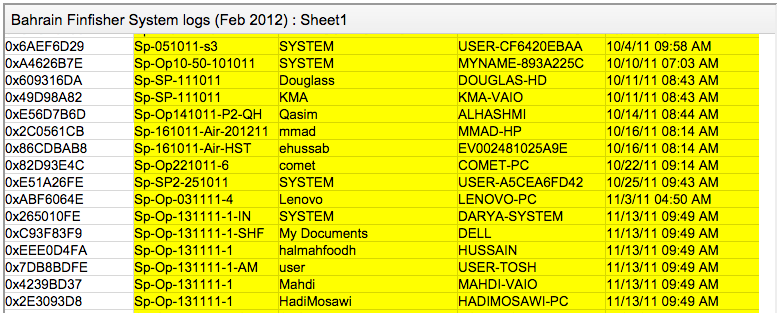







3 comments